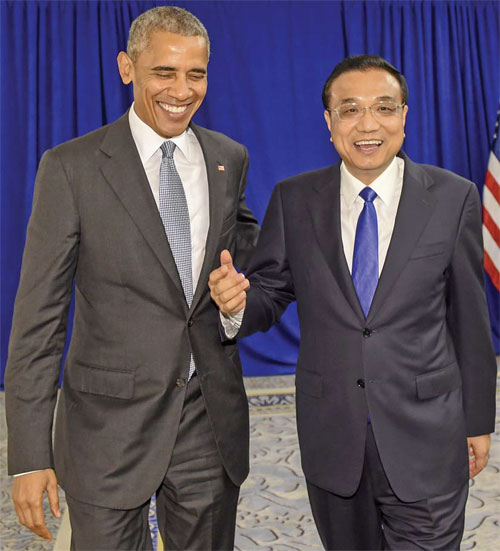Li tells Obama of opposition to THAAD
Premier calls on all parties to avoid escalating tensions on the Korean Peninsula
Premier Li Keqiang voiced Beijing's opposition to the plan by Washington and Seoul to deploy an advanced missile-defense system in the Republic of Korea while meeting with US President Barack Obama in New York.
"It is hoped that all parties will avoid taking actions that lead to escalation of the tense situation," Li said.
|
Premier Li Keqiang meets with US president Barack Obama in New York on Sept 19. Li Xueren / Xinhua |
He and Obama met on the sidelines of the 71st session of the United Nations General Assembly on Sept 19.
This year, Washington and Seoul agreed to deploy the Terminal High Altitude Area Defense system, angering Beijing and Moscow. The system's radar has a maximum reach of 2,000 kilometers and could cover parts of China and Russia.
Tension rose anew on the Korean Peninsula this month after the Democratic People's Republic of Korea conducted a nuclear test in an area near the China-DPRK border.
Li said China endorses the UN Security Council's plan to further respond to the nuclear test by the DPRK.
Beijing remains committed to denuclearization of the peninsula, ensuring peace and stability, and resolving the issue through dialogue and consultation, he said.
A White House statement released later on Sept 19 said Obama and Li "resolved to strengthen coordination in achieving the denuclearization of the Korean Peninsula".
Zhang Tuosheng, director of the research department at the China Foundation for International and Strategic Studies, says China should continue to tackle two tasks simultaneously - counteracting the THAAD deployment plan and strengthening cooperation with the US and the ROK to denuclearize the peninsula.
"No efforts should be spared to resume the Six-Party Talks, and even if the resumption is unlikely, support should be given to other dialogues promoting peace on the peninsula and denuclearization," Zhang says.
Jia Xiudong, a senior researcher of international affairs at the China Institute of International Studies, says the DPRK nuclear tests and the US-ROK plan to deploy THAAD are "pushing the peninsula situation into a deadlock, which does not serve the interests of any party".
The root cause of the nuclear issue is the mutual distrust between the US and the DPRK, and the only way out is to resume dialogue, Jia adds.
During their discussion, Li and Obama also touched upon bilateral trade and investment as well as global issues including sustainable development, refugee crises and peacekeeping.
Contact the writers at [email protected]

























